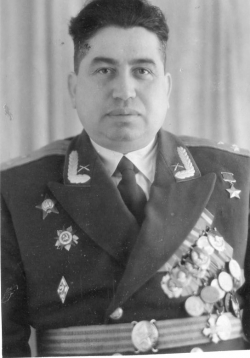Iosif Iufa was born in 1915 in the town of Gorodnia in the Chernigov Province. He was the eldest of five children. In his hometown, Iosif completed seven grades of an incomplete middle school. After that, his family moved to Leningrad to escape the famine that ravaged Ukraine in the early 1930s. In Leningrad, Iosif graduated from a vocational school, and then worked as an iron worker-mechanic at a plant in the city. In 1932, he joined the Red Army. In 1936, Iosif Iufa graduated from the Leningrad Artillery School and went on to serve in Ukraine. Subsequently, he entered the Military Artillery Academy in Leningrad.
Iufa was sent to the front right after the outbreak of the Soviet-German War in late June 1941. When Iosif, fresh from the Academy, reached his regiment, he found that there was a lack of senior commanders there. Thus, at the age of 26, he was appointed assistant commander of the regiment. In late 1941, he was sent to more advanced training, after which he became the commander of a "Katiusha battalion."
In 1942, Iosif Iufa fought on the Stalingrad Front, and later on the 1st Ukrainian Front. During the fighting for Kiev in November 1943, as head of a group of "Guards mortar" [i.e. Katiusha] units, he took part in the crossing of eight regiments to the Liutezh bridgehead on the western bank of the Dnieper. This operation played a decisive role in the liberation of Kiev, despite the enormous losses incurred by the Red Army. For his participation in this operation, Iosif Iufa was awarded the title of Hero of the Soviet Union in February 1944.
Colonel Iufa met V-E Day in Prague. In the course of the war, he was awarded two Orders of Lenin; three Orders of the Red Banner; one Order of the Patriotic War, 1st Class; one Order of the Red Star, and some medals.
After the end of the war in May 1945, Iosif served in the Soviet occupation force in Austria. He later returned to Leningrad, where he graduated from the Artillery Academy in 1951. Because of the antisemitic campaign going on at the time, he had difficulty finding a suitable posting. Eventually, he found a place in Sakhalin, and was assigned to Kamchatka in 1954. In 1958, he retired from active service to the reserves and moved to Moscow. There, he worked as a representative of the Army at the Tushino Machine-Construction Plant.
Iosif Iufa died of a heart attack in October 1974. He was buried at the Peniagino Cemetery in Krasnogorsk (Moscow Region).







